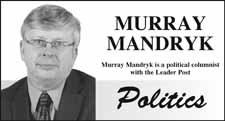To suggest that former NDP premier Roy Romanow did not understand rural Saskatchewan is hardly an outlandish statement.
Like many New Democrats of that era - and perhaps even today - Romanow was likely unwilling to accept changes within the rural economy that made it less reliant on the old co-operative approach and more dependent on the markets.
One might even go as far as to suggest a certain level of indifference to rural Saskatchewan needs best expressed by his decision 15 years ago this week to hold a provincewide election campaign in the middle of a Saskatchewan harvest.
The cold political reality is that the NDP knew its political strength was in the cities and could win power with the urban vote. That's exactly what Romanow and his successor Lorne Calvert did.
But there is also a danger in politics of becoming captivated by just one political narrative that usually emerges out of partisan political propaganda of the government of the day. In the case of the Romanow administration, that generally involves a portrayal of mean-spirited government motivated only by its pursuit of power.
Lost in this sort of portrayal is the reality that the Romanow government faced some major struggles in the early 1990s that proved to be not only a huge distraction to running a good government but also legitimate reasons for making some of the harsh and unpopular decisions it made.
Recently, we have been reminded of this reality as a result of a pending book by Toronto Star columnist Chantel Hebert on the 1995 Quebec referendum.
In her book, Herbert uncovers that Romanow struck a secret committee of high-ranking NDP politicians and civil servants tasked with exploring the reality of a separatist win in the 1995 referendum that fell just 50,000 votes shy of becoming a reality.
Among the gut-wrenching scenarios the secret committee explored was Saskatchewan and the other Western provinces being forced to join the U.S. in the wake of the breakup of the country.
Romanow admitted in a recent interview this option was the farthest flung and had a "near-zero" chance of happening even if the "no" side in Quebec had lost.
Nevertheless, the breakup of the country was a grave concern 19 years ago. And here in Saskatchewan where the province was still financially vulnerable because of the billion-dollar-a-year debt run up by the Grant Devine Progressive Conservatives, it had an added dimension.
Now, one might also argue that the thing that plagued the Romanow government the most was its own constant siege mentality that saw every issue as a crisis perhaps even bigger than it was. There is also validity to this notion and Saskatchewan's economic success of the past two decades likely shows there was less need for panic than Romanow thought at time.
That said, governments can only govern in the here and now, which means that Romanow could not afford to wait and hope for $100-a-barrel oil, the success of the Bakken play or the growth in the potash industry.
Romanow's reality was not having enough money to pay the New York banks holding the province's debt. And most in rural Saskatchewan will recall how those concerns of debt and insolvency translated in the 1993 budget's tax increases, cuts to highway spending and closure of 52 rural hospitals.
Yes, rural Saskatchewan endured a disproportional amount of that pain in 1993. But it wasn't necessarily all driven by mean-spirited, calculating choices made in politics.
In fact, while talking about problems of the day, Romanow recently admitted he had to go to then-lieutenant governor Sylvia Fedoruk armed with a request to call an election in order to convince his own NDP caucus to pass that 1993 budget.
It adds a perspective that we can't completely ignore.
Murray Mandryk has been covering provincial politics for over 22 years.




